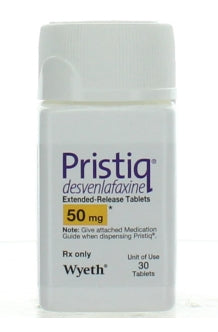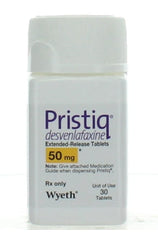شحن مجاني للطلبات فوق 100 ريال


بريستيك 50 مجم لعلاج الاكتئاب الحاد 30 قرص
-
78.50 SR

-

-
78.50

تعذر تحميل مدى توفر الطلب
وصف
xبريستيك 50 مجم، لعلاج الاكتئاب الحاد، 30 قرص
Pristiq 50 mg, for severe depression, 30 tablets
تحتوي حبوب بريستيك ٥٠ لعلاج الاكتئاب الحاد على مادة ديسفينلافاكسين (Desvenlafaxine)، المانعة لإعادة امتصاص السيروتونين، والنورابينفرين (SNRI)، وتحتوي عبوّة بريستيك على 30 قرصًا.
الاستخدامات الطبية الخاصة بدواء بريستيك
يُستخدم دواء بريستيك لعلاج حالات الاكتئاب الحاد.
كيفية استخدام دواء بريستيك
-
يُتناول دواء بريستيك تحت الإشراف الطبي حصرًا.
-
تناول حبوب بريستيك ٥٠ بالجرعة التي حدّدها لك الطبيب.
-
تناول حبوب بريستيك ٥٠ مع كوبٍ من الماء، دون تكسير الحبة أو تقسيمها.
-
يُمكن تناول دواء بريستيك مع الطعام أو بدونه.
-
يُفضّل تناول دواء بريستيك في ذات الموعد يوميًّا.
الآثار الجانبية الخاصة بدواء بريستيك
قد يُصحَب تناول دواء بريستيك بالآثار الجانبية الآتية:
-
الدوار.
-
النعاس.
-
زيادة التعرّق.
-
تغير الوزن.
-
الغثيان.
-
الإمساك.
-
ضعف الشهية.
-
اضطرابات النوم.
-
انخفاض القدرة الجنسية.
موانع استخدام دواء بريستيك
-
الحساسية تجاه مادة ديسفينلافاكسين.
-
لا تستخدم دواء بريستيك إذا سبق وتناولت أحد الأدوية مثبطات أكيسداز أحادي الأمين (MAOI) خلال آخر 14 يومًا، وانتظر 7 أيام قبل تناول أحد أدوية مثبطات أكسيدراز أحادي الأمين، إذا كنت تتناول دواء بريستيك.
-
المرضى دون سن 18.
التحذيرات والاحتياطات أثناء استخدام دواء بريستيك
-
أخبر الطبيب إذا كنت تعاني أيًّا مما يلي:
-
الصرع.
-
التشنجات.
-
زرَق العين.
-
أمراض القلب.
-
أفكار انتحارية.
-
أمراض الكبد.
-
أمراض الكلى.
-
ارتفاع ضغط الدم.
-
ارتفاع الكوليسترول.
-
اضطراب ثنائي القطب.
-
مشكلات التنفس.
-
الضعف الجنسي.
-
-
أخبر الطبيب بجميع الأدوية التي تتناولها قبل تناول دواء بريستيك.
-
تجنّب قيادة السيارة أو الدراجة قدر الإمكان عند استخدام دواء بريستيك.
-
قد يُسبب تناول دواء بريستيك مراودة بعض الأفكار الانتحارية لك؛ ونرجو إخبار الطبيب فورًا عندئذ.
-
قد يُحدِث دواء بريستيك بعض التغيرات في الوزن، زيادةً أو نقصانًا.
استخدام دواء بريستيك أثناء الحمل والرضاعة
-
قد يؤذي تناول حبوب بريستيك ٥٠ طفلكِ إذا تناولتيه أثناء الحمل، ولذا نرجو بيان موقفك من الحمل للطبيب قبل تناول الدواء.
-
يُمكن استشارة الطبيب لمعرفة مدى أمان دواء بريستيك للطفل إذا كنتِ مرضعًا، إذ لم تتضِح آثاره على الطفل الرضيع إلى الآن.
للمزيد من المعلومات عن دواء بريستيك
-
استشِر الطبيب أو الصيدلي الخاص بك.
-
أو من خلال التواصل مع صيدلي صيدليات الجواهر على واتساب 0569072671.
الشحن والإرجاع
xسياسة الاسترجاع والاستبدال
هدفنا في متجر الجواهر هو رضاكم التام 🌸، ونسعى دايمًا نقدم أفضل تجربة تسوق بكل وضوح وعدل. نتعامل مع عملائنا بكل مصداقية، ونتمنى يكون التعامل متبادل بنفس الروح.
في حال تم طلب الإلغاء أو الاسترجاع قبل بدء الشحن، يتم إرجاع المبلغ كامل للعميل.
ويحق للعميل طلب الاسترجاع خلال مدة 3 أيام من تاريخ الاستلام، بشرط:
- أن يكون المنتج غير مستخدم ولم يتم فتحه.
- أن يكون بحالته الأصلية وخالي من أي تلف.
- ألا يكون المنتج من الأصناف المستثناة من الاسترجاع أو الاستبدال.
المنتجات غير القابلة للاسترجاع أو الاستبدال:
- المنتجات التي تحتاج تخزين خاص مثل: أدوية الثلاجة، الحليب، وأغذية الأطفال.
- مزيلات العرق ومنتجات العناية الشخصية والنسائية، إلا في حال وجود عيب مصنعي.
طريقة طلب الاسترجاع أو الاستبدال:
للطلب، يرجى التواصل معنا عبر واتساب على الرقم:
0563649160
في حال طلب الاسترجاع:
بعد التأكيد، يتم إرسال بوليصة شحن للعميل لتسليم المنتج لشركة الشحن وهو بحالته الأصلية.
بعد استلام شركة الشحن للمنتج، يتم إرجاع المبلغ بعد خصم قيمة الشحن خلال مدة من 5 إلى 7 أيام عمل.
في حال طلب الاستبدال:
يتم احتساب قيمة شحن جديدة للطلب البديل.
تنويه مهم:
في حال وصول المنتج بشكل خاطئ من شركة الشحن (باستثناء أدوية الثلاجة، الحليب، وأغذية الأطفال) أو تم إرسال منتج غير صحيح من صيدلية الجواهر المميز، يرجى التواصل مع خدمة العملاء، وبعد التأكد من المشكلة سيتم إرجاع المبلغ كاملًا بعد تسليم المنتج لشركة الشحن.
في حال وصول المنتج مفتوح أو مستخدم أو بحالة غير التي تم شحنه بها، سيتم إلغاء طلب الاسترجاع.
في حال كان الخطأ من شركة الشحن أو تم إرسال منتج خاطئ، نتحمل تكلفة إرسال المنتج لفرع شركة الشحن عبر تطبيقات التوصيل بحد أقصى 20 ريال، في حال كان الفرع بعيد.
في حال عدم استلام العميل للطلب وعودة الشحنة لنا، يتم إرجاع المبلغ بعد خصم قيمة الشحن، وإذا رغب العميل بإعادة الشحن مرة أخرى يتم دفع قيمة شحن جديدة.
قد يعجبك أيضاً!
المنتجات التي تم عرضها مؤخراً
- يؤدي اختيار تحديد إلى تحديث كامل للصفحة.



